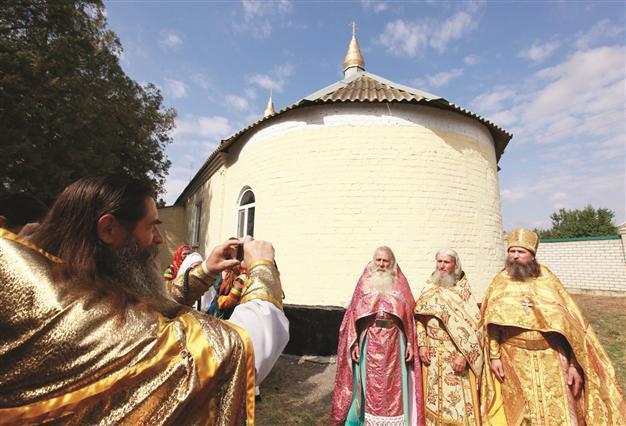Russia allows clerics to join upcoming elections
MOSCOW

A Orthodox Old Believer priest from a community of ethnic Nekrasov Cossacks takes a photo of clergies outside a church. REUTERS photo
The Russian Orthodox Christian Church will allow members of the clergy to participate in elections in the event of “dire ecclesiastical necessity,” again stirring a debate over the Church’s role in politics.
“In the event of dire ecclesiastical necessity, in exceptional situations where action is needed against schismatic or non-Orthodox forces that are seeking to use elected office for fighting the Orthodox Church, the Church will choose people for participation in elections for bodies of state authority,” the resolution passed by the Church on Oct. 4 said.
At the same time, a cleric will not be allowed to be a member of any political party even if he runs on a party ticket, the resolution said. Russian law allows political parties to include non-members on their election lists and appoint them to elected posts.
“A hierarch, cleric, monk or layman who is performing duties of obedience at a general ecclesiastical institution must in advance submit an application to the Patriarch, explaining his reasons for seeking election to a legislative or executive body and stating which non-Orthodox or schismatic groups are planning to use this body for action against the Orthodox Church,” the document said.
The Russian Orthodox Church’s bishops’ council decreed in 2011 that priests would be allowed to run for office to protect church interests. However, it provided few details concerning the applicable rules and procedures other than requiring a cleric to seek the Holy Synod’s sanction beforehand.
Sections of the Russian community oppose the growing influence of religion in politics, but the Russian Orthodox Church denies such tendencies and says that its influence is purely spiritual. According to surveys, half of Russians believe that the Church, which is led by Patriarch Kirill, has a hand in domestic politics and 43 percent feel it interferes in foreign affairs. The conflict became especially evident after the Pussy Riot group held what they called a “punk prayer” in Moscow’s main cathedral, protesting against the alleged ties between the Church and senior Russian authorities.
Christianity is by far the most popular religion in Russia, with some 70 percent of the population saying they are Russian Orthodox Christians, although far fewer regularly attend church.
